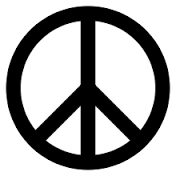peace
英 [piːs]
美 [pis]
- n. 和平;平静;和睦;秩序
- n. (Peace)人名;(英)皮斯
CET4 TEM4 考 研 CET6
1、pact- / pag- => pac- => peac- + -e => peace.
2、pact => peace.
peace 和平,平静来自古法语pais,和平,平和,安静,来自拉丁语pacem,协议,条款,和平条约,来自PIE*pag,固定,词源同page,pact,pacify.词义由固定引申为解决争端,订立条约,引申词义和平,平静。
- peace
- peace: [12] The etymological notion underlying peace is of ‘fastening’, so as to achieve a ‘stable’ condition. The word comes via Anglo-Norman pes from Latin pāx ‘peace’, which was derived from the same base, *pāk- ‘fasten’, as lies behind English pact, and is closely related to pagan, page, pale ‘stake’, and pole ‘stick’. Derivatives of Latin pāx or its Old French descendant to reach English include appease [16], pacific [16], pacify [15], and pay.
=> appease, pacific, pact, pagan, pale, pay, pole - peace (n.)
- mid-12c., "freedom from civil disorder," from Anglo-French pes, Old French pais "peace, reconciliation, silence, permission" (11c., Modern French paix), from Latin pacem (nominative pax) "compact, agreement, treaty of peace, tranquility, absence of war" (source of Provençal patz, Spanish paz, Italian pace), from PIE *pag-/*pak- "fasten," related to pacisci "to covenant or agree" (see pact).
Replaced Old English frið, also sibb, which also meant "happiness." Modern spelling is 1500s, reflecting vowel shift. Sense in peace of mind is from c. 1200. Used in various greetings from c. 1300, from Biblical Latin pax, Greek eirene, which were used by translators to render Hebrew shalom, properly "safety, welfare, prosperity."
Sense of "quiet" is attested by 1300; meaning "absence or cessation of war or hostility" is attested from c. 1300. As a type of hybrid tea rose (developed 1939 in France by François Meilland), so called from 1944. Native American peace pipe is first recorded 1760. Peace-officer attested from 1714. Peace offering is from 1530s. Phrase peace with honor first recorded 1607 (in "Coriolanus"). The U.S. Peace Corps was set up March 1, 1962. Peace sign, both the hand gesture and the graphic, attested from 1968.
- 1. The road to peace will be long and drawn-out.
- 通往和平的道路将很漫长。
来自柯林斯例句
- 2. He argues strongly for retention of NATO as a guarantee of peace.
- 他强烈要求保留北大西洋公约组织以维护和平。
来自柯林斯例句
- 3. One more question and I'll leave you in peace.
- 再问一个问题,我就不打扰你了。
来自柯林斯例句
- 4. Middle East peace talks in Washington showed signs of progress yesterday.
- 昨天在华盛顿举行的中东和谈有了取得进展的迹象。
来自柯林斯例句
- 5. They have been per-suaded of the merits of peace.
- 他们被劝服,认识到了和平的好处。
来自柯林斯例句
[ peace 造句 ]
